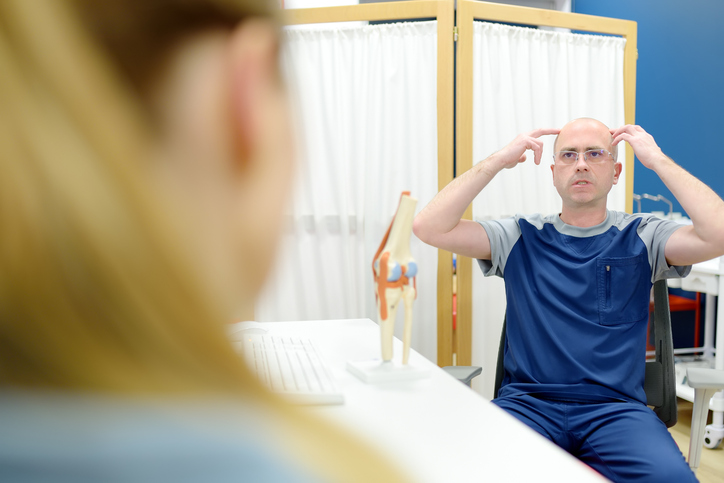
It’s important to know the signs of brain injuries so you can get the right help and care. It doesn’t matter if the injury is from an accident, illness, or other health issue, finding it early can greatly help healing and improve life quality. Here are some things to look out for, and if you or a loved one experiences a head injury or noticeable changes in behaviour, you must seek medical help as soon as possible.
Physical Symptoms
Brain injuries can cause a range of physical symptoms that may appear immediately or develop over time. These are some of the most common signs to look out for:
Headaches: Persistent or worsening headaches that don’t go away with rest.
Dizziness and Balance Issues: Feeling unsteady, lightheaded, or uncoordinated.
Nausea and Vomiting: These symptoms can occur soon after an injury and may persist.
Blurred Vision: Difficulty focusing or seeing clearly.
Fatigue: An overwhelming sense of tiredness that does not improve with rest.
Sensitivity to Light and Noise: Increased discomfort in bright or noisy environments.
Seizures: In some cases, a brain injury can lead to seizures, which require immediate medical attention.
Cognitive Symptoms
A brain injury can affect the way a person thinks, remembers, and processes information. Some common cognitive symptoms include:
Memory Problems: Difficulty remembering recent events or important details.
Confusion and Disorientation: Feeling unsure of time, place, or personal details.
Difficulty Concentrating: Struggling to focus on tasks or conversations.
Slowed Thinking: Taking longer than usual to process information or respond.
Poor Judgment: Making decisions that seem out of character or risky.
Emotional and Behavioural Symptoms
In addition to physical and cognitive changes, a brain injury can also affect our emotions and how we behave. It is important to pay attention to:
Mood Swings: Rapid changes in emotions, from happiness to irritability or sadness.
Depression and Anxiety: Feelings of hopelessness, fear, or worry that interfere with daily life.
Irritability: Becoming easily frustrated or angered over small things.
Personality Changes: Noticing big differences in how a person acts or interacts with others.
Sleep Disturbances: Difficulty falling asleep, staying asleep, or sleeping too much.
When to Seek Help
If you or your loved one is experiencing any of these signs or symptoms, especially following a head injury, it is important to go and see your doctor. Early diagnosis and treatment can help manage symptoms and support recovery. A healthcare professional can assess the severity of the injury and recommend the right course of action, whether it’s rest, therapy, or more specialised care.
How We Can Help
At Eximius Support, we understand how challenging it can be to navigate life after a brain injury. Our compassionate and professional live-in care services are designed to provide personalised support that meets your needs. From assisting with daily activities to offering emotional support, we are here to help you or your loved one feel safe, comfortable, and cared for every step of the way.
If you need support or guidance, reach out to us today to learn how we can assist you or your loved one on the path to recovery.
Supporting Our Clients With Brain Injuries

A brain injury can change your life in ways you might not imagine. It can change everything such as your independence, relationships, and everyday activities. Whether the injury is the result of an accident or a medical condition, compassionate and professional support is going to be the key to recovery and maintaining your quality of life. We want to help you understand the different types of brain injuries to help you make informed decisions about care and support.
Traumatic Brain Injuries (TBI)
Traumatic brain injuries are caused by an external force hitting the head. This causes physical damage to the skull and brain. This could be from a fall, a car accident, or a sports injury, for example. The effects of a TBI can range from mild to severe, and everyone’s experience will be completely different.
Here are some common types of traumatic brain injuries, some more mild than others:
- Concussion: Usually considered a mild form of brain injury, but it can still cause temporary confusion, headaches, and memory issues. With rest and proper care, recovery is likely. But, repeated concussions can have lasting effects.
- Contusion: A contusion is bruising or bleeding within the brain tissue, usually caused by a direct impact to the head. In some cases, surgery is needed to relieve the pressure and prevent further complications.
- Penetrating Injury: These injuries occur when an object pierces the skull and damages the brain. This could be shattered bone or a foreign object from an assault or accident.
- Diffuse Axonal Injury: Caused by rapid movement of the brain within the skull, this type of injury can lead to widespread damage, affecting communication between brain cells. Recovery often requires long-term rehabilitation and support.
Acquired Brain Injuries (ABI)
Unlike traumatic brain injuries, acquired brain injuries occur due to non-traumatic causes, such as medical conditions or other health-related issues. These injuries can develop gradually or occur suddenly, and usually require ongoing care and support.
Common types of acquired brain injuries include:
- Anoxic Brain Injury: This happens when the brain is completely deprived of oxygen, leading to cell damage. Situations like cardiac arrest, drowning, or respiratory failure can result in this type of injury.
- Hypoxic Brain Injury: In this case, the brain receives some oxygen, but not enough to function properly. Conditions such as stroke, carbon monoxide poisoning, or complications during surgery can cause hypoxic injury.
- Stroke-Related Injuries: Strokes happen when blood flow to the brain is disrupted, either by a clot (ischaemic stroke) or bleeding (hemorrhagic stroke). The effects can range from mild weakness to severe physical and cognitive impairments.
- nfections: Brain infections, such as meningitis or encephalitis, can cause inflammation and long-term complications, requiring specialised care and rehabilitation.
Mild vs. Severe Brain Injuries
Brain injuries can vary greatly in severity. Mild injuries, such as concussions, often result in temporary symptoms that improve with rest and proper care. Severe brain injuries may lead to lasting physical, emotional, and cognitive challenges. If you or your loved one is facing a severe injury, ongoing support can make a significant difference in maintaining independence and quality of life.
Diagnosis and Treatment
Getting the right diagnosis is obviously essential for effective treatment and recovery. Healthcare professionals use a combination of physical assessments, imaging tests such as MRI or CT scans, and cognitive evaluations to determine the severity of the injury. The sooner treatment begins, the better the chances for a positive outcome.
Treatment plans are tailored to each person’s needs and may include:
Medical Care: Immediate treatment to stabilise the condition and prevent further damage.
Rehabilitation: Physical therapy, occupational therapy, and speech therapy to regain lost skills and improve quality of life.
Emotional Support: Counselling and psychological support to help cope with changes and adjust to new routines.
Live-in Care Support: Compassionate carers can provide assistance with daily activities, medication management, and companionship, ensuring individuals feel supported in their own homes.
Living with a Brain Injury
A brain injury can bring so many changes, but with the right support, you or your loved one can continue to lead a fulfilling life. At Eximius Support, we understand the challenges that come with brain injuries, and we are here to provide tailored, high-quality care that prioritises dignity and comfort. Whether it’s short-term recovery support or long-term assistance, we are committed to making a positive difference. If you or a loved one need compassionate, professional live-in care, reach out to us today. We are here to help every step of the way.
Further Reading:
Supporting Our Clients With Brain Injuries